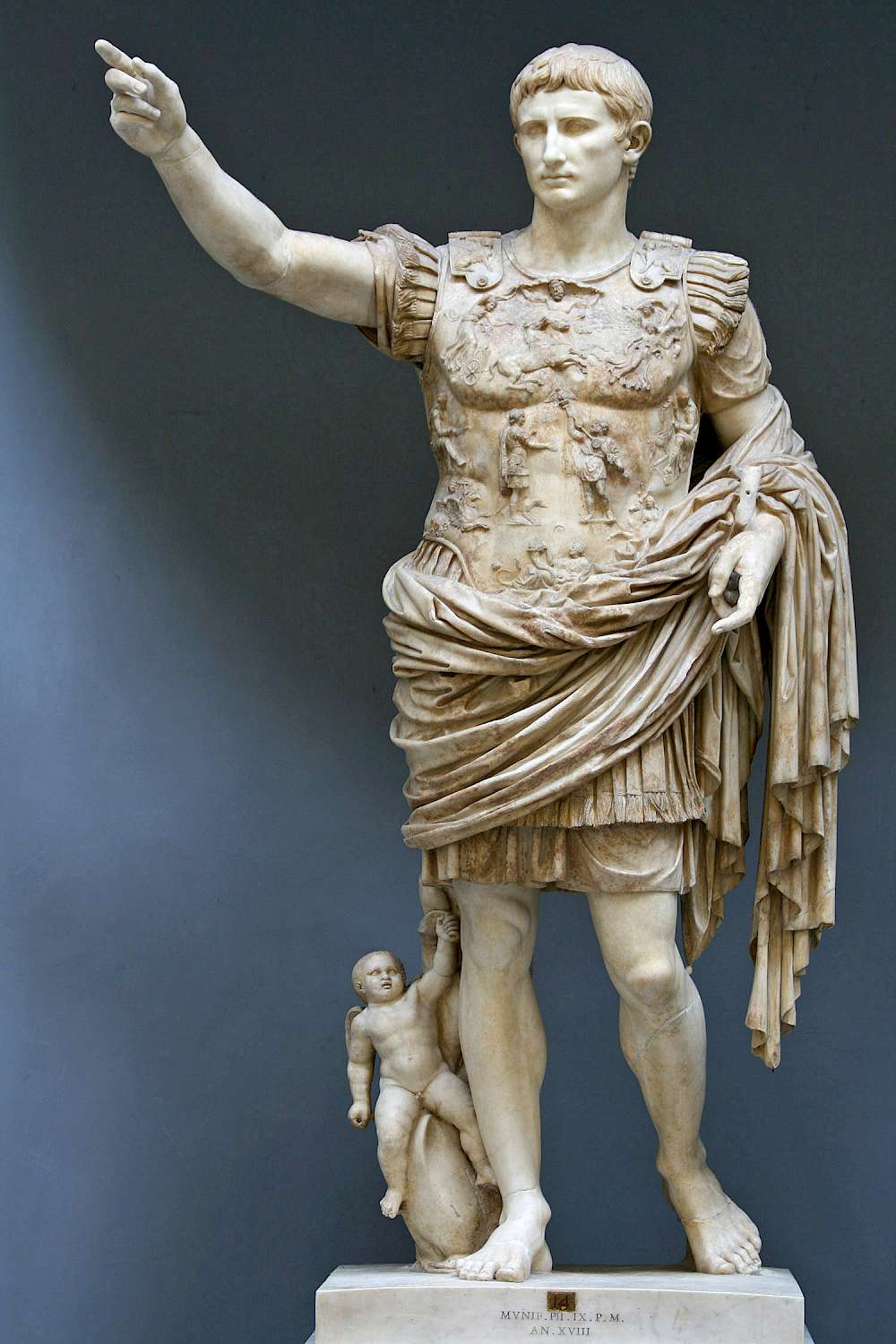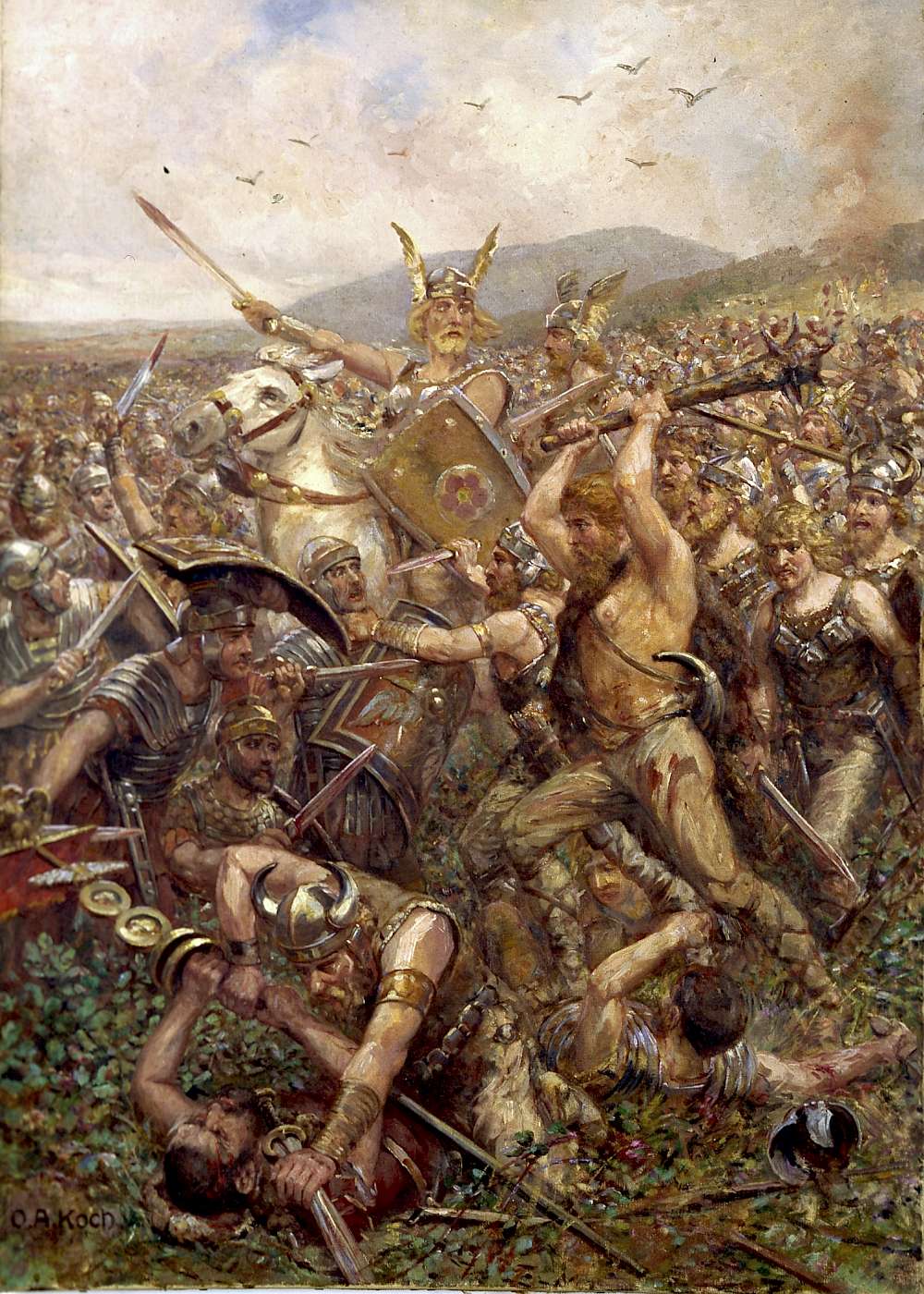One of the most infamous battlefield reverses was the AD 9 Battle of the Teutoburg, in which three Roman legions were ambushed in northern Germany, and close to annihilated. The attack was masterminded by Arminius, a Germanic chieftain of the Cherusci tribe, who also happened to have been raised in Rome as a tribal hostage, have served in the Roman auxilia, and been granted Roman citizenship and Equestrian rank before his return to Germany.
The defeat was a dangerous humiliation for both the Roman Empire and for the emperor Augustus, by that time in the final years of his reign, and is seen by some as the reason that Germania beyond the Rhine never became a province. In antiquity, the defeat was largely blamed on Publius Quinctilius Varus, the provincial governor of Germania who led the legions into the ambush.
The emperor Augustus, on hearing the news, is said to have shouted “Quinctilius Varus, give me back my legions!” (Suet. Augustus 23).
The engagement became known to the Romans as the Clades Variana, or “Varus Disaster”, a moniker that is still used today, and was marked for several years as a day of mourning. But why was one man held responsible for such a large-scale military defeat – and was Varus actually as culpable as the historical record suggested?
The battle came seemingly out of nowhere, after Varus had served for several years as provincial governor of Germania, the newly-acquired province beyond the Rhine. Varus, a friend of Augustus’ step-son and heir Tiberius and minor member of the Imperial family by marriage, had previous experience governing both Africa and Syria, and was seemingly appointed to the Germanic governorship in AD 7 as a “safe pair of hands” to oversee the early stages of provincialisation in Germania.
At the time, Roman military attention was distracted by the Great Illyrian Revolt, which had broken out in AD 6 – what they needed in Germania was a reliable governor who could manage the new province effectively. Instead, they got a governor whose actions seemingly provoked a revolt that would lead to one of the most damaging defeats in Roman history.
The legions involved – probably the 17th, 18th, and 19th – would never be reformed, and no further attempts were made to absorb Germania into the Empire, despite military campaigns there over following centuries.
Problematic policies & responses
One of the accusations levelled against Varus is that his policies in Germania created the discontent which led to the battle. However, when we look at the policies he was putting in place, we see that there is nothing particularly unexpected – the creation of Roman settlements, the holding of markets, the introduction of taxes (Dio 56.18.2-3), and the use of Roman law to settle provincial disputes (Vell. Pat. 2.117.3).
The policy seemed to be working – the Germans were, as one historian noted, “becoming different without knowing it” (Dio 56.18.3) – and the actions taken by Varus do not seem at odds with general Roman provincialisation practices. The main case against Varus in Germany seems to be that he proceeded too fast with the process of provincialisation (Dio 56.18.3), treating the Germans as if they were a fully-conquered and subjugated people, rather than one that still had significant potential for rebellion.
He evidently did not account for how recently the territories had been added to the Empire, and therefore did not consider the possibility of revolt, abstaining from campaigning during the summer months, and travelling through the province “as though he were going among a people enjoying the blessings of peace” (Vell. Pat. 2.117.4).
However, the overall shape of Varus’ policies in Germany would not have been decided by Varus himself, but directed from a distance by the emperor Augustus, who would have dictated an overall mandate for the governing period, and would almost certainly have stayed in contact to deal with any other issues which developed over time (Millar 1966).
Varus may have been in charge of the day-to-day decision making, but would almost certainly not have been the one to decide what level of provincialisation the territory was ready for. Errors in judgement about the speed and scale of change in Germany would therefore fall at the feet of the Imperial regime – Augustus – not their appointed representative in the province.

Whatever the ultimate cause of the discontent in Germany, as provincial governor Varus should have been aware of the situation, and taken measures to reduce the likelihood of an uprising, or to mitigate its worst effects if it could not be stopped. He seems to have received several warnings about the situation, which were ignored.
Evidently, multiple people attempted to warn Varus of a plot against the Romans in Germania, including Arminius’ father-in-law, Segestes – Varus not only ignored them, but “actually rebuked them for being needlessly excited and slandering his friends” (Dio 56.19.3). The rumours against Arminius seem to have been dismissed by Varus as political in-fighting, particularly the testimony of Segestes, who had not approved of his daughter Thusnelda’s marriage to Arminius.
Despite these rumours of unrest in Germany, Varus is said to have weakened his army by sending detachments of soldiers out to villages who asked for Roman assistance (Dio 56.19.1); these men were killed shortly before the Teutoburg attack took place within the communities they had been sent to help.
On a wider scale, Varus seems to have been convinced that he was well-liked among the Germans – although the surviving sources fail to note why he thought this – making rebellion amongst them unlikely (Vell. Pat. 2.118.4). The disregard with which Varus treated rumours of conspiracy and attack have been seen as a complete intelligence failure, with Varus ultimately responsible for investigating any such reports, regardless of how improbable they seemed to him (Sheldon 2001).
But again, when considered in a broader context, Varus’ actions become more understandable. Arminius was a trusted figure to the Roman regime in Germany, more “one of us” than “one of them”. Arminius had been raised in Rome, under a hostage system that both ensured good behaviour on the part of his tribe, and also served to “Romanise” the next generation of leaders once they returned to their people. He had also served in the Roman army, perhaps during the Great Illyrian Revolt, and possibly even alongside Varus at an earlier stage of his career.
It can be little surprise that Arminius was a trusted figure to Varus, who would have had no reason to doubt him – certainly not on the word of others less well-connected to Rome. Arminius remained a close companion of Varus in Germany, often joining his mess (Dio 56.19.2), and may have advised him on provincial issues where appropriate. The Roman provincial system increasingly depended on the loyalty and function of Romanised elites in power within these territories, but this required a level of trust – not the investigation of every (potentially politically-fuelled) rumour against them as if they were guilty until proven innocent.
Poor decisions in the field?
Even in the hours before the battle in the Teutoburg, Varus is still accused by the sources of compounding his earlier errors and making disaster inevitable by his further incompetence. The sources suggest that Varus was incautious while his army was on the march as he thought he was in friendly territory (Dio 56.19.3), that he took a large baggage-train with him, and had a large number of women and children as camp-followers, along with many servants (Dio 56.20.1) – basically, he led an army not expecting to be attacked.

Arminius seems to have deliberately guided the Romans into wooded, marshy terrain, knowing that this would hamper Roman effectiveness under attack – something which, theoretically, Varus should not have allowed to happen, although he was far from the only commander to rely on locals for guidance through a provincial landscape. Once the attack started, Varus attempted to escape the onslaught and reach safe territory on the Rhine, battling for several days through a hostile landscape, building overnight camps, abandoning the baggage-train, and advancing in as ordered a fashion as possible (Dio 56.20.1-21.5).
As it turns out, in trying to escape the attack, Varus may in fact have led his men into an even worse situation – archaeological investigations at Kalkriese, the likely site of the final stages of the battle, suggest that the Romans entered a “kill-zone” at an area known now as the Oberesch, entry to which sealed their fate (Sheldon 2001, p. 30; Morgan 2019, pp. 102-105).
In a narrow sand-bank channel between a mountain and a bog, possibly supplemented by a German rampart constructed shortly before the battle, the Germans overwhelmed the Roman soldiers who had survived several days under near-constant attack; at this stage, the Roman army seems to have entered a phase of combat disintegration, and many let themselves be killed without offering any further resistance (Dio 56.21.1-2).
The legions were overwhelmed, and most of the Roman soldiers killed or captured; Varus was either killed or killed himself in the last stages of the battle.
Although the Romans did not escape the attack on the Teutoburg, Varus may have done as good a job as any commander could have done in the situation, once the attack had begun. His actions are largely consistent with those taken by others caught in a similar situation – burning the baggage, building a fort, and trying to reach safe territory – which seems to have been standard Roman practice after an ambush (Morgan 2019, pp. 98-102).
It was a mistake to enter the Oberesch area, but there was no realistic way for Varus to know that – he no longer had Arminius to guide his army through the landscape, and any scouts he despatched would almost certainly have been killed before they could return to him. In some ways, it is actually a testament to Varus that he and his army managed to maintain combat cohesion for several days, and made an impressive attempt to break out from the attack and reach the Rhine.
Ultimately, their efforts were undone by the levels of preparation which Arminius had put into the attack. Varus did what should be done by a commander in his position – but Arminius’ military experience in the Roman auxilia meant that he was able to anticipate Varus’ every decision, and make provision against it. Varus was not necessarily a bad commander during the attack – he was just up against someone better.
An Imperial problem
Based on the evidence, it is difficult to see Varus as being solely to blame for the AD 9 Teutoburg disaster. He doubtless made mistakes, and likely exacerbated an already problematic situation, but was ultimately not personally responsible for many of the major factors behind the unrest in Germany.
Rather, it was the Imperial policies mandated to Varus by Augustus and the Imperial regime, which rushed provincialisation processes in a territory not yet ready for them, which seem most to blame for the unrest that led to the attack. It is likely that Augustus was aware of that, at least on some level, as he made no further effort to encompass Germany within the Empire, and advised his successor Tiberius to do the same; if the disaster had been the fault of just one man, now dead, this policy would make little sense.
Varus was perhaps a flawed governor and commander who more than met his match in Arminius – but it may also be the case that his reputation was sacrificed to protect Augustus from blame. Augustus’ aims in Germany may have been overambitious, as he aimed to consolidate his reputation in what he must have suspected would be the later years of his reign.
The Res Gestae, a long inscription written by Augustus to catalogue his life achievements, emphasised how Augustus had brought peace to Germany (26), a claim which was not abandoned in the aftermath of the Teutoburg. Admitting his mistakes in the orders he gave to Varus may have been politically undesirable for Augustus in AD 9 – it was much easier to blame the provincial governor caught up in the attack, who had not survived to clear his name.
The defeat may also have been excessively blamed on Varus to avoid giving undesired credit to Arminius, who had masterminded the attack. Arminius, as a provincial “barbarian” who had grown up in Rome, had been granted the privilege of rank and Roman citizenship, who had served in the auxilia, only to turn against his former allies, was unlikely to be granted much respect by the Roman regime.
Further, his defection potentially highlighted the dangers of training local elites within the Roman army, only for them to use this knowledge against Rome later; another rebel leader, Tacfarinas, would demonstrate similar dangers in Africa less than a decade later. The main way to draw the sting from this was to (re)cast Varus as an incompetent, to suggest that the defeat happened because Varus lost the battle, rather than because Arminius had won it with a strategy that any Roman would have struggled against.
Although Arminius was murdered by his own men within a few years, his reputation in history has since been recovered; sadly for Varus, the same is unlikely to ever be the case for him.
Further reading
- F. Millar, “The Emperor, the Senate and the provinces”, Journal of Roman Studies 56.1/2 (1966), pp. 156-166.
- D. Morgan, “The generalship of P. Quinctilius Varus in the Clades Variana”, Antichthon 53 (2019), pp. 87-107.
- R.M. Sheldon, “Slaughter in the forest: Roman intelligence mistakes in Germany”, Small Wars and Insurgencies 12.3 (2001), pp. 1-38.
